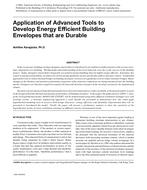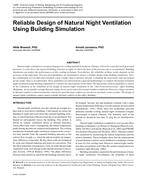With progressive reductions in engine size in modern automobiles, less heat is being rejected by the engine to the coolant. Consequently, it is becoming increasingly difficult to rapidly achieve and maintain passenger thermal comfort under severe winter driving conditions. Two different options for supplementary electric heating have been studied experimentally, and the results are reported. It is found that low-power electric heating pads installed on the seat and back support greatly reduce the time needed to attain thermal comfort. Further reductions in warm-up time can be achieved by installing electric heaters in the air ducts, although the power requirements associated with this method are substantial. Two criteria for evaluating the performance of automotive heating systems are proposed.
KEYWORDS: experiment, thermal comfort, motor cars, calculating, performance, winter, electric heaters, heating, occupiers
Citation: ASHRAE Transactions, vol.97, Pt. 1, New York 1991
Product Details
- Published:
- 1991
- Number of Pages:
- 8
- File Size:
- 1 file , 910 KB
- Product Code(s):
- D-18259


